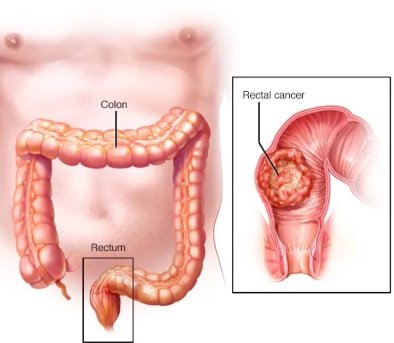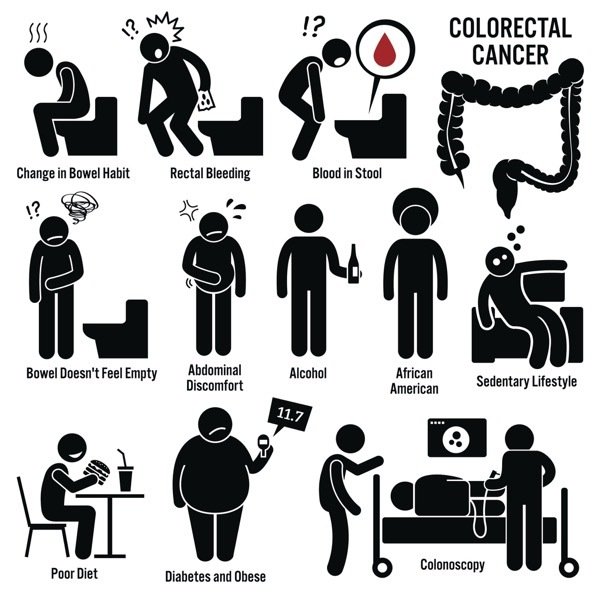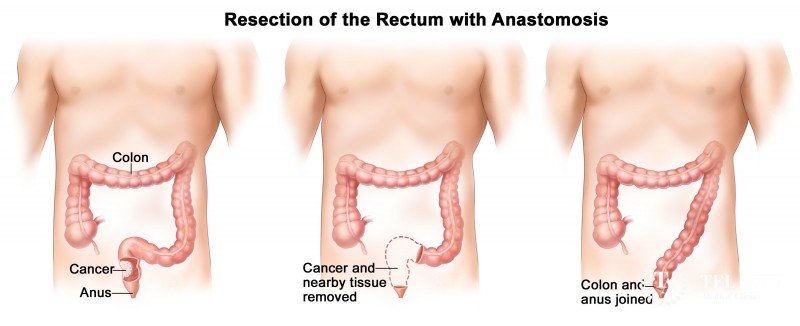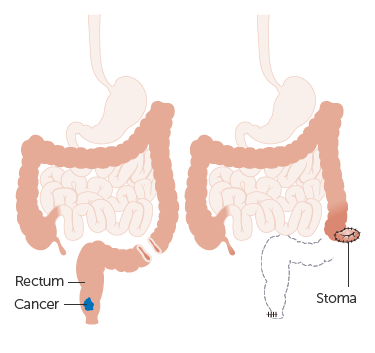Rectal Cancer
Rectal cancer is a type of cancer that begins in the rectum. The rectum is the large intestine’s last few inches. It begins at the end of your colon and terminates when it reaches the short, narrow tube leading to the anus.
Cancers of the rectum (rectal cancer) and the colon (colon cancer) are sometimes referred to as “colorectal cancer.”
While rectal and colon cancers are similar in many aspects, their therapies differ significantly. This is mostly due to the rectum’s small size and proximity to other organs and tissues. Rectal cancer surgery might be complicated due to the limited space.
Long-term survival for persons with rectal cancer was previously unusual, even after comprehensive treatment. Rectal cancer survival rates have increased dramatically in recent decades as a result of therapy advancements.
Our minimally invasive Laparoscopic Rectal Cancer Surgery ensures better precision and reduced complications. The laparoscopic method supports quicker recovery and improved outcomes.


Symptoms
- A change in bowel habits, such as diarrhea, constipation or more-frequent bowel movements
- Dark maroon or bright red blood in stool
- Narrow stool
- A feeling that your bowel doesn’t empty completely
- Abdominal pain
- Unexplained weight loss
- Weakness or fatigue
Treatment
Rectal cancer treatment often involves a combination of therapies. When possible, surgery is used to cut away the cancer cells. Other treatments, such as chemotherapy and radiation therapy, may be used after surgery to kill any cancer cells that remain and reduce the risk that cancer will return.
If surgeons are concerned that the cancer can’t be removed completely without hurting nearby organs and structures, your doctor may recommend a combination of chemotherapy and radiation therapy as your initial treatment. These combined treatments may shrink the cancer and make it easier to remove during an operation.

Surgery
Rectal cancer is often treated with surgery to remove the cancer cells. Which operation is best for you depends on your particular situation, such as the location and stage of your cancer, how aggressive the cancer cells are, your overall health, and your preferences.
Operations used to treat rectal cancer include:
- Removing very small cancers from the inside of the rectum. Very small rectal cancers may be removed using a colonoscope or another specialized type of scope inserted through the anus (transanal local excision). Surgical tools can be passed through the scope to cut away the cancer and some of the healthy tissue around it.
- This procedure might be an option if your cancer is small and unlikely to spread to nearby lymph nodes. If a lab analysis finds that your cancer cells are aggressive or more likely to spread to the lymph nodes, your doctor may recommend additional surgery.
- Removing all or part of the rectum. Larger rectal cancers that are far enough away from the anal canal might be removed in a procedure (low anterior resection) that removes all or part of the rectum. Nearby tissue and lymph nodes are also removed. This procedure preserves the anus so that waste can leave the body normally.
- How the procedure is performed depends on the cancer’s location. If cancer affects the upper portion of the rectum, that part of the rectum is removed and then the colon is attached to the remaining rectum (colorectal anastomosis). All of the rectum may be removed if the cancer is located in the lower portion of the rectum. Then the colon is shaped into a pouch and attached to the anus (coloanal anastomosis).
- Removing the rectum and anus. For rectal cancers that are located near the anus, it might not be possible to remove the cancer completely without damaging the muscles that control bowel movements. In these situations, surgeons may recommend an operation called abdominoperineal resection (APR) to remove the rectum, anus and some of the colon, as well as nearby tissue and lymph nodes.
- The surgeon creates an opening in the abdomen and attaches the remaining colon (colostomy). Waste leaves your body through the opening and collects in a bag that attaches to your abdomen.


Therapy
Chemotherapy
- Chemotherapy uses drugs to destroy cancer cells. For rectal cancer, chemotherapy might be recommended after surgery to kill any cancer cells that might remain.
- Chemotherapy combined with radiation therapy might also be used before an operation to shrink a large cancer so that it’s easier to remove with surgery.
- Chemotherapy can also be used to relieve symptoms of rectal cancer that can’t be removed with surgery or that has spread to other areas of the body.
Radiation Therapy
- Radiation therapy uses powerful energy sources, such as X-rays and protons, to kill cancer cells. In people with rectal cancer, radiation therapy is often combined with chemotherapy that makes the cancer cells more likely to be damaged by the radiation. It can be used after surgery to kill any cancer cells that might remain. Or it can be used before surgery to shrink a cancer and make it easier to remove.
- When surgery isn’t an option, radiation therapy might be used to relieve symptoms, such as pain.
Combined Chemotherapy and Radiation Therapy
- Combining chemotherapy and radiation therapy (chemoradiotherapy) makes cancer cells more vulnerable to radiation. The combination is often used for larger rectal cancers and those that have a higher risk of returning after surgery.
Chemoradiotherapy May be Recommended
- Before surgery. Chemoradiotherapy may help shrink the cancer enough to make a less invasive surgery possible. The combined treatment may increase the chance that your operation will leave the anal area intact so waste can leave the body normally after surgery.
- After surgery. If surgery was your first treatment, your doctor may recommend chemoradiotherapy afterward if there’s an increased risk that your cancer may return.
- As the primary treatment. Your doctor may recommend chemoradiotherapy to control the growth of cancer if your rectal cancer is advanced or if surgery isn’t an option.
- Targeted drug therapy
- Targeted drug treatments focus on specific abnormalities present within cancer cells. By blocking these abnormalities, targeted drug treatments can cause cancer cells to die.
Targeted Drugs
- Targeted drugs are usually combined with chemotherapy. Targeted drugs are typically reserved for people with advanced rectal cancer.
Immunotherapy
- Immunotherapy is a drug treatment that uses your immune system to fight cancer. Your body’s disease-fighting immune system may not attack your cancer because the cancer cells produce proteins that help them hide from the immune system cells. Immunotherapy works by interfering with that process.
- Immunotherapy is usually reserved for advanced rectal cancer.
Supportive (palliative) Care
- Palliative care is focused on providing relief from pain and other symptoms of a severe illness. Palliative care specialists work with you, your family and your other doctors to provide an extra layer of support that complements your ongoing care.
- Palliative care is provided by a team of doctors, nurses and other specially trained professionals. Palliative care teams aim to improve the quality of life for people with cancer and their families. This form of care is offered alongside curative or other treatments you may be receiving.
